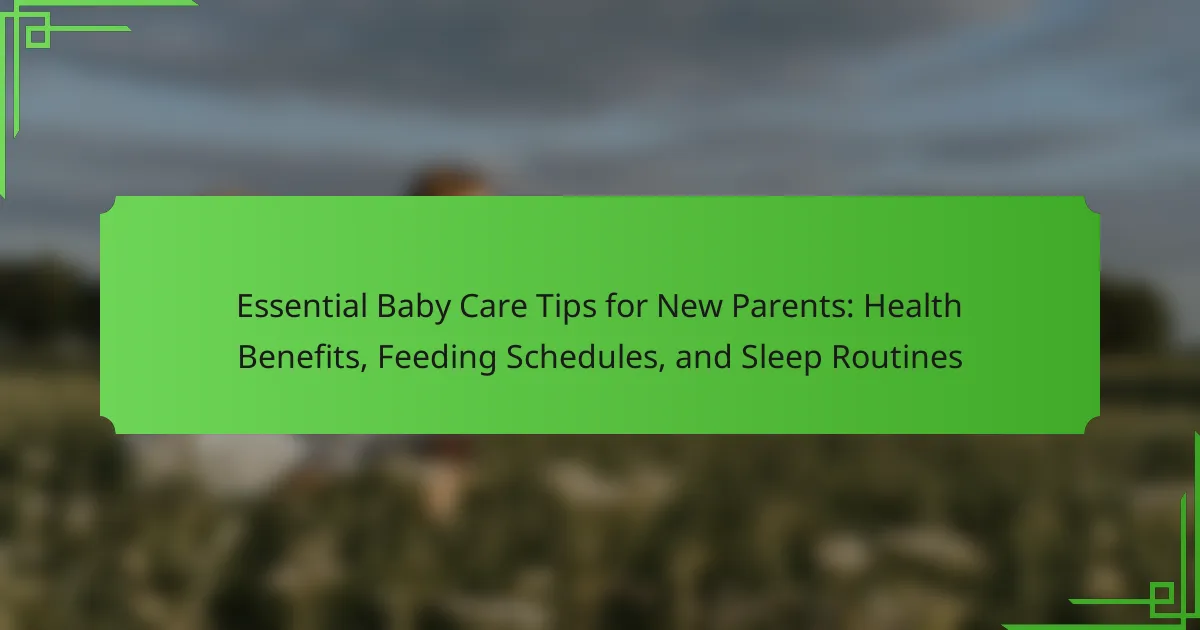Essential baby care encompasses crucial practices for new parents aimed at ensuring the health and well-being of their infants. Key aspects include establishing a consistent feeding schedule every 2 to 3 hours, maintaining proper diaper changes to prevent rashes, and bathing the baby 2 to 3 times a week until the umbilical cord falls off. Safe sleep practices, such as placing the baby on their back to reduce the risk of Sudden Infant Death Syndrome (SIDS), are essential. Regular pediatrician visits for vaccinations and health checks, along with recognizing and responding to the baby’s cues for comfort and hunger, are also vital. Additionally, creating a calm environment promotes better sleep for the baby.

What are Essential Baby Care Tips for New Parents?
Essential baby care tips for new parents include establishing a consistent feeding schedule. Feeding should occur every 2 to 3 hours for newborns. Parents should ensure proper diaper changes to prevent rashes. Bathing should be done 2 to 3 times a week until the umbilical cord falls off. Safe sleep practices are crucial; placing the baby on their back reduces SIDS risk. Regular pediatrician visits are necessary for vaccinations and health checks. Parents should also recognize and respond to the baby’s cues for comfort and hunger. Lastly, creating a calm environment promotes better sleep for the baby.
How do these tips support the health and well-being of a baby?
These tips support the health and well-being of a baby by providing essential care practices. Proper feeding schedules ensure that babies receive adequate nutrition for growth. Consistent sleep routines promote healthy sleep patterns, which are crucial for brain development. Hygiene practices reduce the risk of infections and illnesses. Responsive caregiving fosters emotional security and attachment. Each of these elements contributes to the overall physical and emotional health of the baby. Research indicates that responsive parenting improves developmental outcomes (National Institute of Child Health and Human Development).
What are the key health benefits of proper baby care?
Proper baby care promotes healthy growth and development. It ensures adequate nutrition, which is vital for physical and cognitive development. Regular check-ups prevent potential health issues through early detection. Proper hygiene practices reduce the risk of infections and illnesses. A stable routine contributes to emotional security, aiding mental health. Responsive caregiving fosters secure attachment, which is crucial for social development. Research shows that well-cared-for infants exhibit better long-term health outcomes. Proper baby care lays the foundation for a healthy future.
Why is it important for new parents to follow these tips?
Following essential baby care tips is crucial for new parents to ensure the health and well-being of their infants. These tips provide guidance on feeding, sleep routines, and overall care. Proper feeding schedules support healthy growth and development. Adhering to sleep routines helps establish a sense of security for the baby. Research indicates that consistent routines can improve a child’s emotional regulation. Additionally, these tips can reduce stress for new parents, promoting a more harmonious family environment. Overall, following these tips fosters a nurturing atmosphere that benefits both parents and their infants.
What are the essential feeding schedules for newborns?
Newborns typically require feeding every 2 to 3 hours. This schedule ensures they receive enough nutrition for growth. Each feeding session usually lasts 20 to 30 minutes. Breastfed newborns may feed more frequently than formula-fed ones. They should consume about 1.5 to 3 ounces per feeding. As they grow, feeding frequency may decrease. By two months, some may feed every 3 to 4 hours. Consistent feeding helps establish a routine and supports healthy development.
How often should a newborn be fed?
Newborns should be fed every 2 to 3 hours. This frequency ensures they receive adequate nutrition for growth and development. Feeding on demand is also recommended, as newborns may signal hunger at varying intervals. According to the American Academy of Pediatrics, newborns typically consume about 1.5 to 3 ounces per feeding. This pattern helps establish a healthy feeding routine.
What types of feeding methods are recommended for new parents?
Breastfeeding and formula feeding are the two primary feeding methods recommended for new parents. Breastfeeding provides essential nutrients and antibodies that support a baby’s immune system. The World Health Organization recommends exclusive breastfeeding for the first six months of life. Formula feeding offers a suitable alternative for parents unable to breastfeed. It provides balanced nutrition tailored to infants’ needs. Both methods can be combined, known as mixed feeding, to suit individual circumstances. Parents should consult healthcare professionals for personalized guidance on feeding methods.
How can sleep routines be established for infants?
Establishing sleep routines for infants involves creating consistent sleep patterns. Parents should set a regular bedtime and follow calming pre-sleep activities. Activities may include bathing, reading, or gentle rocking. A quiet, dimly lit environment promotes relaxation. Infants benefit from a consistent sleep schedule, ideally sleeping at the same times daily. Research indicates that routines help infants fall asleep faster and sleep longer. According to the American Academy of Pediatrics, consistency in sleep routines supports better sleep quality.
What are the recommended sleep durations for different age groups?
Newborns require 14 to 17 hours of sleep per day. Infants aged 4 to 11 months need 12 to 15 hours. Toddlers, aged 1 to 2 years, should get 11 to 14 hours. Preschoolers, aged 3 to 5 years, require 10 to 13 hours of sleep. School-age children, aged 6 to 13 years, need 9 to 11 hours. Teenagers, aged 14 to 17 years, should aim for 8 to 10 hours. Adults typically require 7 to 9 hours of sleep. The National Sleep Foundation provides these recommendations based on extensive research on sleep needs across different life stages.
How can parents create a conducive sleep environment for their baby?
Parents can create a conducive sleep environment for their baby by ensuring a dark, quiet, and comfortable space. A dark room promotes melatonin production, which aids sleep. White noise machines can mask disruptive sounds. Maintaining a comfortable room temperature between 68-72°F is ideal for infant sleep. A firm mattress with a fitted sheet provides a safe sleeping surface. Parents should avoid placing soft toys or blankets in the crib to reduce suffocation risks. Establishing a consistent bedtime routine signals to the baby that it is time to sleep. Research indicates that a consistent sleep environment can improve sleep quality and duration in infants.
What common challenges do new parents face in baby care?
New parents commonly face challenges in baby care, including sleep deprivation, feeding difficulties, and managing health concerns. Sleep deprivation occurs as newborns often wake frequently during the night. This can lead to exhaustion and stress for parents. Feeding difficulties may arise from issues like latching problems during breastfeeding or digestive issues in formula-fed babies. Parents also worry about their baby’s health, including monitoring for signs of illness or developmental milestones. Balancing these challenges can be overwhelming, especially for first-time parents. Studies show that about 70% of new parents experience significant stress related to these issues.
How can parents effectively manage feeding and sleep issues?
Parents can effectively manage feeding and sleep issues by establishing consistent routines. Regular feeding times help infants learn when to expect meals. This predictability can reduce fussiness and increase comfort. For sleep, creating a calming bedtime routine signals to the baby that it is time to rest. Techniques such as dimming lights and playing soft music can promote relaxation. Research shows that babies thrive on routine, which can lead to better sleep patterns and feeding habits. A study published in the Journal of Pediatrics found that infants with structured feeding and sleep schedules exhibit improved overall well-being.
What practical tips can new parents implement for effective baby care?
New parents can implement several practical tips for effective baby care. Establish a consistent feeding schedule to ensure proper nutrition. Breastfeeding is recommended for the first six months for optimal health benefits. Use a diaper change routine to maintain hygiene and prevent rashes. Create a safe sleep environment by placing the baby on their back in a crib without loose bedding. Engage in skin-to-skin contact to promote bonding and emotional security. Monitor the baby’s development milestones to ensure they are on track. Regular pediatrician visits are essential for vaccinations and health check-ups. Finally, seek support from family or parenting groups to share experiences and advice.
Essential baby care tips for new parents focus on establishing consistent feeding schedules, maintaining proper hygiene, and promoting safe sleep practices to ensure the health and well-being of infants. Key aspects include feeding newborns every 2 to 3 hours, implementing calming sleep routines, and recognizing signs of hunger and comfort. The article highlights the health benefits of these practices, such as supporting growth, reducing the risk of infections, and fostering emotional security. Additionally, it addresses common challenges faced by new parents and offers practical tips for effective baby care, emphasizing the importance of regular pediatrician visits and a supportive environment.
